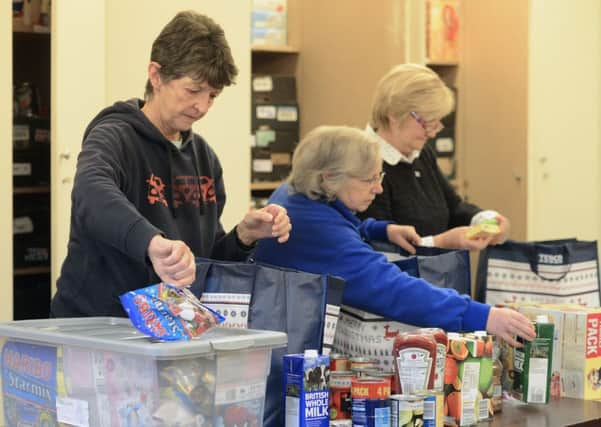One in every 100 Scots will have visited food bank


There was an increase of 14,527 on the numbers turning to foodbanks in the last year The Trussell Trust said, although it warned that the figure was a “conservative estimate” and could be worse.
Scotland now has 43 food banks which helped around 39,000 people with emergency supplies between 1 April and 23 December, the trust claimed.
Advertisement
Hide AdAdvertisement
Hide AdHowever, Ewan Gurr, the charity’s Scotland development officer, yesterday said the numbers were likely to soar to over 55,000 – approximately a hundredth of the population – when the financial year finishes at the end of March 2014.
The charity claims that the UK government’s controversial programme of cuts to public services and benefits has contributed to the sharp increase in the use of food banks.
Mr Gurr said: “I don’t think we’re going to see any improvement in the short term. I would expect the numbers to reach at least 55,000 by the end of March 2014, and that is a conservative estimate.
“If things continue as they are, with food banks getting busier and new food banks opening, it will top that.”
Any economic growth is being undermined by rising living costs, welfare cuts and a lack of jobs, the charity, which runs foodbanks, claimed.
The charity has insisted that food poverty is a “hugely significant” issue not only for next year’s independence referendum but and the general election in 2015.
Mr Gurr said: “It is not scaremongering, it is reality and the coalition government can ignore that as much as they want.
“They can focus on the 0.8 per cent growth in the economy and decreasing unemployment throughout the country. That’s good. That is something we celebrate, but there is more work to be done.
Advertisement
Hide AdAdvertisement
Hide Ad“The rising cost of living means that those in work are harder-pressed than they ever were.
“We are seeing an increasing number of people who are in work, who had sustainable incomes five years ago but, because of the rising cost of living, are not able to make that income stretch as far as it used to.
“People in that position are unable to put food on the table, or have to use a food bank.”
Scottish Labour health spokesman Neil Findlay backed the charity’s claims as he called for cross party co-operation in Scotland to tackle poverty linked to food bank use.
He said: “The rising number of people forced to use food banks to survive is a national scandal – that goes beyond the party political dogfight.
“We need the combined efforts of politicians across the political spectrum and at all levels of government to address this crisis.
“It is completely immoral that in this day and age we have families who can’t feed themselves. Addressing this crisis should be the top political priority in 2014.”
A Scottish Government spokeswoman said: “It is unacceptable that anyone in a country as prosperous as Scotland should have to rely on food banks.
Advertisement
Hide AdAdvertisement
Hide Ad“The UK is already one of the most unequal societies in the developed world, and the Westminster government’s welfare cuts programme unfairly impacts on some of the most vulnerable members of our society.”
However, the UK government dismissed the claims the increased use of food banks was linked to changes to welfare benefits.
A UK government spokeswoman said: “The benefits system supports millions of people who are on low incomes or unemployed and there is no robust evidence that welfare reforms are linked to increased use of food banks.”
SEE ALSO: